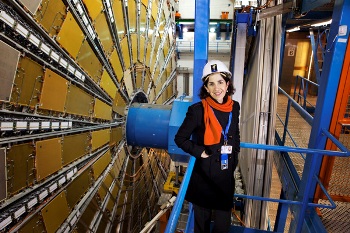Apr 6 2013
CERN physicist Fabiola Gianotti will be at Stanford Monday and Tuesday, April 8-9, to deliver the Physics Department's annual Robert Hofstadter Memorial Lectures. Gianotti is a senior research physicist at CERN and leads the ATLAS experiment, one of the two experiments at the Large Hadron Collider that detected the famous Higgs boson particle last summer.
 Particle physicist Fabiola Gianotti is the leader of one of the two teams to detect the Higgs boson particle. She will deliver the 2013 Hofstadter Lectures at Stanford, public talks that will detail the discovery and why it is important. Credit: Claudia Marcelloni
Particle physicist Fabiola Gianotti is the leader of one of the two teams to detect the Higgs boson particle. She will deliver the 2013 Hofstadter Lectures at Stanford, public talks that will detail the discovery and why it is important. Credit: Claudia Marcelloni
Gianotti will deliver two lectures during her visit. The first, titled "The Higgs Boson and Our Life," is geared toward a public audience and will take place at 8 p.m. Monday. In this talk, Gianotti will detail the unprecedented instruments and techniques that made the Higgs discovery possible, and the challenges scientists faced along the way.
She also will explain why the Higgs boson is such a crucial piece for understanding fundamental physics, and thus the structure and evolution of the universe, as well as the implications for day-to-day life. The free event will take place at the Hewlett Teaching Center, 370 Serra Mall, Room 200.
The following day, Gianotti will lead a more technical afternoon colloquium on "The Higgs Boson and Other Recent Results from ATLAS." Gianotti will detail measurements of the Higgs boson particle, which in many cases are based on the data recorded in 2011 and 2012, and will lay out scientists' current understanding of this very special particle and future inquiries into its nature. This talk will take place at 4:15 p.m. in Room 201 of the Hewlett Teaching Center.
Both events are free and open to the public.
On July 4, 2012, Gianotti's team announced that it had detected, along with another experiment at CERN, the Higgs boson particle. The detection of this particle confirmed the existence of the theoretical Higgs field, proposed in the 1960s as the universal medium that endows all other elementary particles with mass. This was a monumental moment in physics, said Stanford physics Professor Savas Dimopoulos.
"The discovery of the Higgs boson is so important because it was the final confirmation of the Standard Model of elementary particle physics," Dimopoulos said. "At the moment, the Standard Model is the theory that describes everything that happens in the universe. This includes electricity and magnetism, which we are familiar with, but also how atoms form and other subatomic interactions. Everything that we have observed in the universe is described by the Standard Model."
Gianotti earned her PhD in sub-nuclear physics from the University of Milan, Italy, and has worked since 1987 on several particle physics experiments at CERN, which operates the world's largest particle physics laboratory. She has worked on the ATLAS experiment since 2003, and was appointed to the top position in 2009, taking over the leadership of the project's 3,000 physicists, setting the group's overall scientific strategy and overseeing the day-to-day operations of the massive particle detector.
The Hofstadter Lectures commemorate the late Nobel Prize-winning physicist Robert Hofstadter, who was a member of the Stanford faculty from 1950 until his death in 1990. Eminent speakers are invited each year to give lectures on the subjects of physics and the physics of medicine.